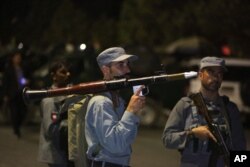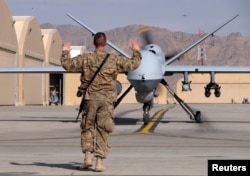As the Islamic State terror group loses ground in Iraq and Syria, U.S. and Afghan forces are stepping up their attacks on the group's offshoot in eastern Afghanistan's Nangarhar province.
The U.S. military, in coordination with Afghan security forces, are pounding IS hideouts in Achin, Haskamena and Kot districts with rockets being fired from Jalalabad airfield where U.S. troops are stationed.
The terror group has been active in the eastern region of the country for almost two years.
U.S and Afghan security forces have been conducting ground and air operations against IS militants in the Nangarhar for some time now. The rocket attacks, however, indicate an intensification in the war against IS in the country.
Attaullah Khogyani, Nangarhar provincial government spokesperson told VOA that the rocket attacks on IS hideouts are conducted based on intelligence provided by the Afghan security agencies.
He added that the rocket attacks have targeted key IS members, killing several of them.
Rocket attacks more accurate
Local residents in areas under IS control echo Khogyani's account and have welcomed the move, saying rocket attacks are more accurate and effective. Ground operations by Afghan security forces, they say, result in civilian casualties at times.
Waliullah, a local resident in Deh Bala district said rockets have targeted IS positions only, without causing harm to the civilians in the area.
“Airstrikes and ground operations have caused civilian casualties. Rockets fired from the city (U.S. military base) are accurate and do not target civilians,” Waliullah told VOA's Afghan service.
U.S. and Afghan security forces have been engaged in joint- counterterrorism operations against IS militants in Nangarhar and neighboring Kunar province.
Drone strike a success
Earlier this year, U.S military and Afghan government promised to eliminate IS in Afghanistan by the end of 2017. Hundreds of IS fighters, including several senior commanders have been killed in recent months.
A suspected U.S. drone strike late Tuesday reportedly targeted a gathering of IS militants in Kunar province, killing 11 fighters, including four key IS commanders.
Pentagon did not immediately confirm Tuesday's drone strike.
The IS terror group has been active in several districts in Nangarhar province. Recently, it has expanded to neighboring mountainous Kunar and Nuristan provinces as well, which share a border with Pakistan, to establish a persistent presence there.
Militant leaders killed
IS has drawn the majority of its members from the Pakistani Taliban fighters, some former Afghan Taliban, and other militants from varied nationalities, including militants from India, Iran, Russia and central Asian neighbors.
In May, the terror group lost Sheikh Abdul Hasib, its leader in Afghanistan. Hasib was killed in a joint U.S. Afghan forces raid in eastern Nangarhar.
His predecessor and founder of IS's branch in Afghanistan, Hafiz Saeed Khan — a former Pakistani Taliban commander — was also killed in a U.S. drone strike in July of 2016.






